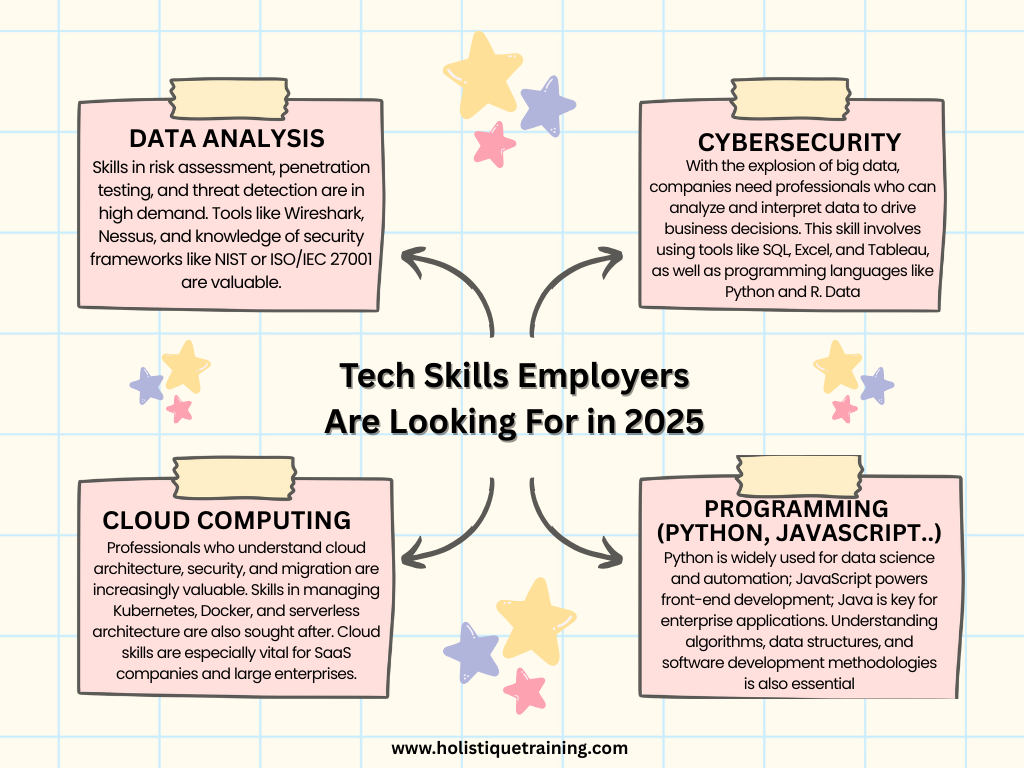- Table of Contents
- Introduction
- Why Is the Tech Job Market Changing So Rapidly?
- Artificial Intelligence (AI):
- Digital Transformation:
- Remote Work:
- Global Tech Adoption:
- How AI and Automation Are Reshaping Tech Careers
- Top Tech Skills Employers Are Looking For in 2025
- 1. Data Analysis and Interpretation
- 2. Cybersecurity
- 3. Cloud Computing
- 4. Programming (Python, JavaScript, etc.)
- How Do Companies Determine What Jobs Are "In Demand"?
- The 10 Most In-Demand Tech Jobs for 2025
- 1. AI Engineer
- 2. Cloud Architect
- 3. Cybersecurity Analyst
- 4. Data Scientist
- 5. DevOps Engineer
- 6. Full-Stack Developer
- 7. Machine Learning Engineer
- 8. Product Manager (Tech)
- 9. UI/UX Designer
- 10. Network Administrator
- Summary Table:
- Career Tips for Tech Job Seekers in 2025
- 1. Focus on In-Demand Skills
- 2. Build a Strong Portfolio
- 3. Network and Stay Informed
- 4. Pursue Relevant Certifications
- 5. Adaptability and Lifelong Learning
- Conclusion
Introduction
The world of technology is evolving faster than ever. With each new innovation, the demand for specialized talent grows exponentially. From artificial intelligence to cloud computing, the modern workplace is becoming increasingly reliant on tech experts who can adapt, innovate, and lead. As we enter 2025, understanding which tech jobs are most in demand is crucial for job seekers, employers, and educators alike. This article explores the forces reshaping the tech job market and presents the ten most in-demand technology roles for 2025, along with actionable insights for anyone looking to thrive in this dynamic field.
Why Is the Tech Job Market Changing So Rapidly?
Several key forces are accelerating change in the tech job market.
Artificial Intelligence (AI):
As AI continues to improve, businesses are integrating it into their operations-from customer service chatbots to predictive analytics-creating new jobs while altering existing ones. For example, demand is rising for AI specialists, machine learning engineers, and data analysts who can interpret AI-generated insights.
Digital Transformation:
Traditional industries are rapidly adopting technology to streamline operations, improve customer experience, and remain competitive. Retail, finance, and healthcare sectors, in particular, are investing heavily in IT infrastructure and automation tools.
Remote Work:
Accelerated by the COVID-19 pandemic, remote work has also redefined workplace expectations. It has increased the need for cybersecurity experts, cloud engineers, and network administrators to maintain secure and efficient virtual work environments.
Global Tech Adoption:
Global Tech Adoption across emerging markets is expanding the reach of digital tools. Countries in Asia, Africa, and South America are witnessing rapid digitization, creating a surge in demand for IT professionals on a global scale.
Together, these trends are not only reshaping the job market but also highlighting the urgent need for continuous learning and adaptability among tech workers.
How AI and Automation Are Reshaping Tech Careers
AI and automation are transforming the nature of work across all industries. While some fear these technologies may eliminate jobs, the reality is more nuanced. Certain roles—particularly those involving routine, manual tasks—are being automated. However, many more jobs are evolving, and entirely new roles are being created.
For example, AI has changed how businesses handle customer service, fraud detection, and supply chain management. Instead of relying solely on human input, organizations now depend on automated systems that require monitoring, optimization, and constant improvement—tasks handled by AI engineers, data scientists, and DevOps specialists.
Automation is also streamlining software development and testing. With tools that can write code, conduct quality assurance checks, and deploy updates, developers are now focusing more on strategic and creative aspects of programming.
Moreover, as AI systems become more sophisticated, the need for professionals who can train, supervise, and ethically manage these systems is growing. This includes roles like AI ethicists, machine learning operations (MLOps) specialists, and algorithm auditors.
Far from making tech jobs obsolete, AI and automation are increasing the demand for higher-order skills like problem-solving, creativity, and emotional intelligence. Professionals who embrace these changes and continue to learn will find themselves at the forefront of the tech job market in 2025.
Top Tech Skills Employers Are Looking For in 2025

1. Data Analysis and Interpretation
With the explosion of big data, companies need professionals who can analyze and interpret data to drive business decisions. This skill involves using tools like SQL, Excel, and Tableau, as well as programming languages like Python and R. Data analysts are essential across sectors such as marketing, healthcare, and finance.
2. Cybersecurity
As cyber threats grow more sophisticated, cybersecurity remains a top priority. Skills in risk assessment, penetration testing, and threat detection are in high demand. Tools like Wireshark, Nessus, and knowledge of security frameworks like NIST or ISO/IEC 27001 are valuable. Cybersecurity professionals are critical in sectors like banking, healthcare, and government.
3. Cloud Computing
Organizations are shifting to cloud platforms like AWS, Microsoft Azure, and Google Cloud. Professionals who understand cloud architecture, security, and migration are increasingly valuable. Skills in managing Kubernetes, Docker, and serverless architecture are also sought after. Cloud skills are especially vital for SaaS companies and large enterprises.
4. Programming (Python, JavaScript, etc.)
Proficiency in coding remains foundational. Python is widely used for data science and automation; JavaScript powers front-end development; Java is key for enterprise applications. Understanding algorithms, data structures, and software development methodologies (e.g., Agile, Scrum) is also essential. Programmers are indispensable in virtually every tech sector.
How Do Companies Determine What Jobs Are "In Demand"?
Employers rely on several metrics to identify in-demand jobs. These include:
Factor | Description |
|---|---|
Number of Job Postings | Platforms like LinkedIn and Indeed analyze millions of listings to track trends. |
Salary Levels | Higher salaries often indicate greater demand for a limited talent pool. |
Skill Scarcity | When certain skills are rare but crucial, related roles become high priority. |
Industry Growth | Rapidly expanding sectors such as fintech, e-commerce, and health tech require more specialized workers. |
According to the U.S. Bureau of Labor Statistics, tech occupations are projected to grow by 15% from 2021 to 2031—much faster than average. LinkedIn’s 2024 Emerging Jobs Report also noted that roles in AI, cloud computing, and cybersecurity saw the highest year-over-year increase in postings.
The 10 Most In-Demand Tech Jobs for 2025
The rapid evolution of technology means that the demand for skilled professionals is also changing at an unprecedented pace. As we move toward 2025, industries are looking for experts who can navigate the complexities of AI, cloud computing, cybersecurity, and automation. Whether you're a developer, a data scientist, or a product manager, understanding which tech jobs are most sought-after will help you align your career aspirations with the industry's needs. Here's a breakdown of the top 10 tech jobs that are predicted to be in high demand by 2025.
1. AI Engineer
AI Engineers design and develop artificial intelligence models and systems that mimic human intelligence. They build algorithms and create systems that can perform tasks such as pattern recognition, decision-making, and natural language processing. This role blends computer science, mathematics, and data analysis to create intelligent systems that automate tasks and make data-driven decisions.
With the increasing adoption of AI across various sectors like healthcare, finance, and retail, the need for skilled AI engineers is soaring. AI's ability to transform industries—by improving efficiency, personalizing customer experiences, and automating complex tasks—has made this role crucial for any organization looking to stay competitive in 2025.
Key Skills Required:
- Python: The go-to language for AI development, used for everything from machine learning to data analysis.
- TensorFlow: A framework for building and training machine learning models, essential for AI development.
- Data Modeling: Strong understanding of how to build and interpret data models is critical for AI engineers.
Average Salary: $120,000–$160,000
Industries Hiring: Healthcare, Fintech, Technology, Automotive.
AI engineers are essential for industries that are pushing the boundaries of innovation, such as autonomous vehicles in the automotive industry and personalized healthcare solutions in medical technology.
2. Cloud Architect
A Cloud Architect designs and manages cloud computing systems, including infrastructure, applications, and data storage solutions. They oversee the cloud migration process and ensure that companies have scalable, secure, and cost-efficient cloud environments to store and process data.
As more businesses shift to remote operations and rely on cloud platforms like AWS, Microsoft Azure, and Google Cloud, cloud architects are needed to design and manage these digital infrastructures. The shift towards remote work and digital transformation is fueling the demand for cloud experts who can ensure secure and efficient cloud adoption.
Key Skills Required:
- AWS: A leading cloud service provider, understanding AWS architecture is essential for cloud architects.
- DevOps: Knowledge of development and operations processes, particularly for continuous integration and deployment.
- Security Protocols: As cloud environments handle sensitive data, knowledge of cloud security is vital.
Average Salary: $135,000–$170,000
Industries Hiring: SaaS, Banking, Healthcare, Education.
With the growth of cloud-based solutions across industries, demand for cloud architects is expected to remain high, especially in sectors focusing on scalable infrastructure like SaaS and healthcare.
3. Cybersecurity Analyst
Cybersecurity Analysts protect an organization’s computer systems and networks from cyber-attacks and data breaches. They monitor networks for security threats, implement defensive measures, and work to ensure compliance with data protection regulations.
As cyber threats become increasingly sophisticated, the need for cybersecurity experts is at an all-time high. In 2025, the rise in remote work and the increasing frequency of data breaches will drive demand for cybersecurity analysts who can safeguard sensitive information.
Key Skills Required:
- Penetration Testing: Evaluating systems for vulnerabilities by simulating cyber-attacks.
- SIEM Tools: Tools like Splunk and ArcSight are used to monitor and analyze security events.
- Network Security: Knowledge of firewalls, VPNs, and intrusion detection systems is crucial.
Average Salary: $95,000–$130,000
Industries Hiring: Government, Finance, Healthcare, Retail.
Cybersecurity professionals are needed in every industry where sensitive data is involved, including government organizations, financial institutions, and healthcare providers.
4. Data Scientist
Data Scientists analyze complex data sets to uncover patterns, trends, and insights that help companies make informed business decisions. They use statistical methods, machine learning models, and programming languages like Python and R to manipulate and interpret large volumes of data.
As data-driven decision-making becomes central to business strategy, organizations are increasingly relying on data scientists to transform raw data into actionable insights. With businesses accumulating vast amounts of data, the need for skilled professionals who can process and analyze this information continues to rise.
Key Skills Required:
- Python: Used for data manipulation and building machine learning models.
- SQL: Essential for querying and managing relational databases.
- Machine Learning: Knowledge of algorithms like regression, clustering, and classification.
Average Salary: $110,000–$145,000.
Industries Hiring: Retail, Fintech, Healthcare, E-commerce.
Data scientists are in demand across multiple sectors, from retail and e-commerce looking to optimize customer experience to healthcare aiming to predict patient outcomes.
5. DevOps Engineer
DevOps Engineers are responsible for automating and optimizing the processes between software development and IT operations. They work to ensure continuous integration, deployment, and monitoring of software applications, reducing manual work and streamlining workflows.
As more companies adopt Agile methodologies, DevOps has become a key component of the software development lifecycle. With increasing demand for rapid application delivery and the rise of cloud-based infrastructure, DevOps engineers play a crucial role in maintaining efficient, scalable systems.
Key Skills Required:
- CI/CD Tools: Jenkins, GitLab CI, and others for continuous integration and deployment.
- Kubernetes: Essential for managing containerized applications in cloud environments.
- Automation Tools: Knowledge of automation tools like Chef, Puppet, or Ansible is crucial.
Average Salary: $105,000–$135,000.
Industries Hiring: SaaS, Telecommunications, Media.
DevOps Engineers are in demand across industries that rely on fast, efficient software development processes, such as telecommunications, media, and SaaS companies.
6. Full-Stack Developer
Full-Stack Developers are responsible for both the front-end and back-end development of web applications. They handle everything from building user interfaces (UI) to managing databases and server-side logic. Full-stack developers are well-versed in a range of programming languages, frameworks, and tools to create seamless and interactive web applications.
With the rapid growth of e-commerce, SaaS, and web-based applications, Full-Stack Developers are crucial for creating comprehensive digital solutions. Their versatility and ability to handle both front-end and back-end development make them highly sought after by companies looking to streamline development processes.
Key Skills Required:
- JavaScript: Essential for both front-end and back-end development, particularly with frameworks like React and Node.js.
- SQL/NoSQL Databases: Knowledge of database management systems like MySQL or MongoDB.
- Version Control: Git proficiency is important for managing code changes in collaborative environments.
Average Salary: $100,000–$135,000.
Industries Hiring: E-commerce, Media, Startups.
Full-stack developers are in demand in fast-growing startups and e-commerce platforms where efficient, cross-functional teams are key.
7. Machine Learning Engineer
Machine Learning Engineers focus on creating algorithms and models that allow computers to learn from data and make predictions or decisions without explicit programming. They build the infrastructure required to process large amounts of data and develop machine learning models.
As more industries adopt machine learning for tasks like predictive analytics, personalized recommendations, and autonomous systems, the demand for machine learning engineers continues to rise. The integration of machine learning across sectors such as retail, healthcare, and finance is driving job growth in this field.
Key Skills Required:
- TensorFlow/PyTorch: Key tools for developing machine learning models and deep learning frameworks.
- Python: A widely-used programming language in data science and machine learning.
- Statistical Analysis: Understanding statistical methods is essential for developing robust machine learning algorithms.
Average Salary: $120,000–$160,000
Industries Hiring: Finance, Retail, Manufacturing
Machine learning engineers are essential in industries that use AI for data analysis and automation, such as finance for fraud detection and retail for personalized customer experiences.
8. Product Manager (Tech)
Product Managers in tech oversee the development and launch of new technology products or features. They manage the product lifecycle, working with developers, designers, and stakeholders to ensure that the product meets customer needs, stays on schedule, and aligns with the business's strategic goals.
As technology companies continue to innovate and launch new products, the role of a product manager becomes increasingly critical. They are responsible for translating customer needs into product features and ensuring that development processes align with market trends and business objectives. With rapid innovation in SaaS and tech products, this role is in high demand.
Key Skills Required:
- Agile Methodology: Knowledge of Agile frameworks for product development and project management.
- Research Skills: Ability to conduct market research to identify customer needs.
- Roadmapping: Proficiency in creating and maintaining product roadmaps to guide development.
Average Salary: $115,000–$150,000
Industries Hiring: SaaS, Logistics, Fintech.
Product managers are highly sought after in SaaS and fintech companies, where quick, agile development cycles and customer-centric products are paramount.
9. UI/UX Designer
UI/UX Designers focus on the user interface (UI) and user experience (UX) of digital products. They ensure that websites and applications are not only visually appealing but also intuitive, accessible, and easy to use. They conduct user research, design wireframes, and test prototypes to create seamless digital experiences.
With the proliferation of mobile apps and websites, businesses understand that user experience can make or break a product. As companies invest in creating products that are both functional and enjoyable to use, the demand for skilled UI/UX designers has surged. Their expertise ensures customer retention and satisfaction.
Key Skills Required:
- Figma: A collaborative design tool for creating user interfaces and wireframes.
- User Research: Conducting usability testing and collecting user feedback.
- Accessibility: Ensuring that digital products are usable for people with disabilities.
Average Salary : $85,000–$110,000
Industries Hiring: E-commerce, Health Tech, Startups.
UI/UX designers are crucial in sectors where customer satisfaction and ease of use are critical, such as e-commerce platforms, healthcare apps, and emerging tech startups.
10. Network Administrator
Network Administrators manage and maintain the IT infrastructure of a company, ensuring that networks are functional, secure, and efficient. They are responsible for configuring and troubleshooting hardware, software, and communication systems within a business's network.
As businesses continue to rely on digital networks and remote work solutions, the need for skilled network administrators is rising. These professionals ensure that businesses have robust and secure networks, which are critical for operations and communication, especially with the increased reliance on cloud services and remote work tools.
Key Skills Required:
- VPNs: Knowledge of virtual private networks for secure remote access.
- Firewall Configuration: Understanding how to set up and maintain firewalls to protect against unauthorized access.
- ITIL: Familiarity with IT service management frameworks for network operations.
Average Salary: $80,000–$105,000
Industries Hiring: Public Sector, Telecom, Healthcare
Network administrators are in demand in industries where network security and stability are a priority, such as telecom providers and public sector organizations.
Summary Table:
Job Title | Key Skills | Average Salary | Industries Hiring |
|---|---|---|---|
AI Engineer | Python, TensorFlow, Data Modeling | $120K–$160K | Healthcare, Fintech, Tech |
Cloud Architect | AWS, DevOps, Security | $135K–$170K | SaaS, Banking, Healthcare |
Cybersecurity Analyst | Pen Testing, SIEM, Network Security | $95K–$130K | Government, Finance, Healthcare |
Data Scientist | Python, SQL, Machine Learning | $110K–$145K | Retail, Fintech, Healthcare |
DevOps Engineer | CI/CD, Kubernetes, Automation | $105K–$135K | SaaS, Telecom, Media |
Full-Stack Developer | JavaScript, Node.js, SQL | $100K–$135K | E-commerce, Media |
Machine Learning Engineer | TensorFlow, Python, Stats | $120K–$160K | Finance, Retail, Manufacturing |
Product Manager (Tech) | Agile, Research, Roadmapping | $115K–$150K | SaaS, Logistics, Fintech |
UI/UX Designer | Figma, Research, Accessibility | $85K–$110K | E-commerce, Health Tech |
Network Admin | VPNs, Firewalls, ITIL | $80K–$105K | Public Sector, Telecom |
Career Tips for Tech Job Seekers in 2025
As the tech job market becomes increasingly competitive, here are some strategies to help you stand out:
1. Focus on In-Demand Skills
In 2025, the most sought-after skills will include cloud computing, cybersecurity, AI, and programming languages like Python and JavaScript. Stay ahead of the curve by acquiring certifications and deepening your expertise in these areas.
2. Build a Strong Portfolio
For tech professionals, having a portfolio is essential to showcase your work. Whether you're a developer, designer, or data scientist, demonstrating your ability through personal projects, freelance work, or contributions to open-source projects can set you apart from other candidates.
3. Network and Stay Informed
Join tech communities, attend conferences, and participate in online forums like GitHub or Stack Overflow. Networking with other professionals in your field can help you stay informed about the latest trends and increase your visibility in the job market.
4. Pursue Relevant Certifications
Certifications like AWS Certified Solutions Architect, Certified Information Systems Security Professional (CISSP), and Google Professional Data Engineer are highly regarded in the tech industry. These credentials can validate your skills and enhance your employability.
5. Adaptability and Lifelong Learning
The tech landscape is constantly evolving. The ability to learn new tools and technologies quickly is vital. Stay adaptable by continuously upgrading your skills through online courses, workshops, and training programs.
Conclusion
The tech job market in 2025 is poised for significant growth, driven by advancements in AI, cloud computing, cybersecurity, and other transformative technologies. By focusing on in-demand roles, acquiring the right skills, and building a strong professional presence, you can position yourself to thrive in this rapidly changing industry. Keep learning, stay updated on industry trends, and embrace the future of technology.
For more insights and the latest updates on tech careers, subscribe to our newsletter today!
























